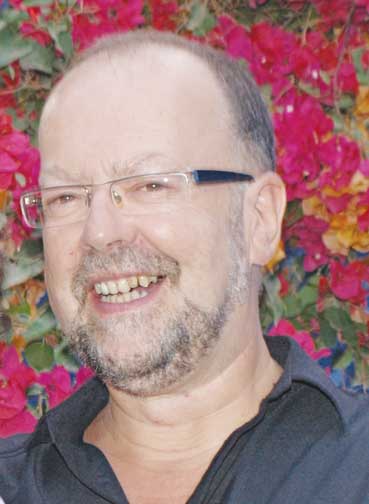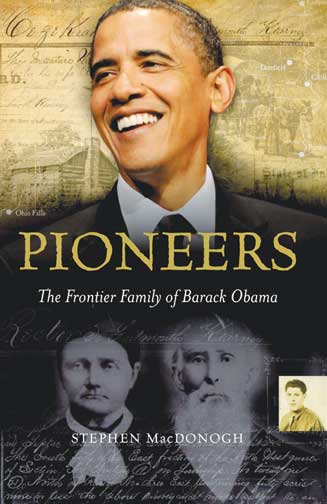


SERVICES
Tuesday October 5, 2010
The Pioneer Spirit
Author Stephen MacDonogh Gwen Orel Chats To Author Stephen MacDonogh About His New Book 'Pioneers: The Frontier Family Of Barack Obama'That America's first president of color is partly Irish is no news to anybody with a computer. Scratch that: anybody awake during the campaign. How could you miss "There's no one as Irish as Barack Obama?" It was posted and reposted to facebook, excerpted on television, sent and even sung in pubs (if you haven't seen it yet, check it out online on YouTube). John Cash's documentary about Tipperary even showed a troupe of Irish dancers who had named themselves the Obama dancers. Stephen MacDonogh's book PIONEERS: THE FRONTIER FAMILY OF BARACK OBAMA explores Obama's Irish heritage - and it's a story well worth telling. Turns out, this story is much more than an interesting little anecdote. John F. Kennedy was not the first Irish-American president of the United States - by a long shot. There were eight before him, uncluding Ulysses S. Grant and George Washington. Both Andrew Jackson's parents were born in Ireland. And so were William McKinley's. Protestant Irish have formed a strong core in the making of this country. The book follows the story of the Kearney family, who came to America in the eighteenth century. Obama's great-great-great-great-great-great uncle Thomas, from County Offaly, Ireland, was first to emigrate - coming to Baltimore. MacDonough traces Thomas' journey through Virginia, Tennessee and Kentucky to Scioto Valley, Ohio - where he settled. There he settled and encouraged his nephew Joseph, Obama's direct ancestor, to emigrate too. It's the story of America - a nation of mutts. Anyone interested in geneology, American history, or Irish American history will want to put this book in their library. The book is also a reminder that although Obama is seen as the first black president, the 44th president of the United States is really bi-racial. He's as white as he is black. And it's the story of Protestant Irish emigrants, a story told far less often than the story of Catholic Irish in America. "We all know about the massive contribution of Catholic Irish in America. Now it transpires there's an equally enormous contribution made by Protestant Irish." A six part television series on the Irish in America, MacDonogh says, described Al Smith as the first Irish-American to run for office. "It's ludicrously incorrect! There were 8 Irish-American presidents before Al Smith tried!" (Smith, who ran in 1928, was the first Roman Catholic to run for president; he was defeated by Herbert Hoover). It's the story of one family, whose movements are emblematic of so many thousands of people who developed the frontier. The story really hasn't been told before about the extent to which this was done by Protestant Irish," said MacDonogh who was visiting New York last week from his home in Dingle. PIONEERS, which came out October 4th in Dufour Editions, Inc., includes many photographs of the family, from both sides of the Atlantic, some never published before, and original research. MacDonogh followed the path of the Kearneys in America, visiting graveyards, talking to relatives, digging through archives and historical records. The book took him eighteen months from concept to finish, he said. That's a remarkable quick turnaround for a historical volume under any circumstances. Even more remarkable is that MacDonogh never intended to be the one to write it - just the publisher to commission it. Then his author had to step down a few months in - and MacDonogh took over. He thought the story would be a simple post-famine emigration story - and discovered it was far more complicated than that: "I didn't break the news of Obama's Irishness; that was done by ancestry.com," he laughs. But, he was attracted by the "ring of hope and aspiration about Obama. The last time my generation paid this much attention to someone we reposed faith in was John F. Kennedy. He fired the imagination. There was a feeling of great positivity that America might elect a person of color." As he began exploring the story of the Kearneys MacDonogh realized that it wasn't even a post-famine story - they had begun emigrating 60 years before the famine. "That led me to discover a whole pattern of pre-famine emigration that I wasn't aware of and very rarely mentioned."
When Obama's Irishness came out, people thought it was kind of funny - perhaps with a little element of racism, that a black man could be Irish, MacDonogh muses. Most people, MacDonogh explains, thought there must be some tiny link to Ireland. But it turned out the link was absolutely direct. Obama's paternal ancestry is very untypical of African-Americans - he doesn't trace his roots through slavery. But his maternal ancestry is "typical of millions of white Americans." The Kearney family were not prominent people - there are no books about them, so MacDonogh recreated their narrative through documents of land transactions and research material about what life was life for frontier people that were clearing the forests. "Men had to work from dawn to dusk, but women's work was never done. They had enormous numbers of children, and made not only their own clothes, but the cloths for the clothes." While MacDonogh;s request for an interview at the Oval Office was denied, he did speak to Obama;s 94-year-old great uncle Ralph Dunham in Springfield, Virgina. Mr. Dunham even approved proofs of the book. While Obama does seem interested in his heritage personally, he doesn't seem particularly interested in Ireland politically, MacDonogh observes - which is consistent with the approach of Protestant Irish in America. Protestant Irish integrated quickly, and didn't organize themselves as being Irish any more than Germans, Dutch or the English did. Catholic Irish-Americans, who faced discrimination, held more tightly to their Irish identities. Teddy Roosevelt said the Presbyterian Ulsterman was "of all men the best fitted to conquer the wilderness" (a line quoted by the RUC man Nelson, in Ron Hutchinson's play Rat in the Skull, luminously portrayed in the 1st Irish Festival by Tom O'Leary). And some of America's legendary pioneers were Protestant Irish-Andrew Jackson, Davy Crockett, Daniel Boone. But Teddy Roosevelt also said in 1915, "there is no room in this country for hyphenated-Americans." Obama "not wrapping the green flag around himself is consistent with that heritage." Obama's unified vision of being American - the American states, not red or blue states - is "characteristic of people of his background. As generations went on, the consciousness of being Irish waned quickly for Protestant Irish. They integrated, identifying with their occupations, social status and religious affiliations, rather than their ethnicity. Obama would have brown up completely unconscious of that aspect of his heritage." When MacDonogh visited a graveyard in Ohio he found 25 Kearney graves, in a cemetery with many Welsh, German, English names. Most of the gravestones simply listed names and dates. On the Kearney graves were statements: "born in Moneygall, King's County, Ireland." Ireland was where they were born. But they died as unhypenated Americans. |
CURRENT ISSUE

RECENT ISSUES


SYNDICATE
[What is this?]
POWERED BY

HOSTED BY

Terms of Service | Privacy Policy
Website Design By C3I







